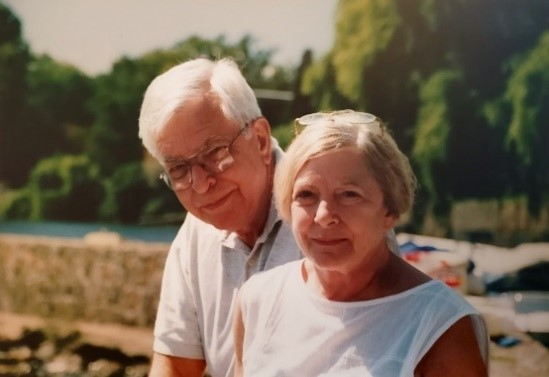 For RICHARD T. and FRANCES W. JOHNSON, known affectionally as Dick and Fran, a chance conversation at a writer’s conference in Colorado sparked the start of what would eventually become a partnership of more than half a century. United by a shared love of travel and adventure, and a sense of curiosity and appreciation for the people and cultures of the world, Dr. and Mrs. Johnson visited and lived in more than 50 countries during their lifetimes. Married for 54 years, they devoted their lives to their family, careers and to the mission of Johns Hopkins Medicine and the Department of Neurology.
For RICHARD T. and FRANCES W. JOHNSON, known affectionally as Dick and Fran, a chance conversation at a writer’s conference in Colorado sparked the start of what would eventually become a partnership of more than half a century. United by a shared love of travel and adventure, and a sense of curiosity and appreciation for the people and cultures of the world, Dr. and Mrs. Johnson visited and lived in more than 50 countries during their lifetimes. Married for 54 years, they devoted their lives to their family, careers and to the mission of Johns Hopkins Medicine and the Department of Neurology.
Mrs. Johnson was born in Torrington, CT and spent her childhood through college years there, graduating from Connecticut College. She was a gifted teacher and writer who balanced her professional career with her roles as a mother and a spouse.
Mrs. Johnson worked for many years in the Johns Hopkins School of Medicine’s Department of Student Affairs. Oftentimes described as the den mother of the Department of Neurology, she was a warm, inclusive, compassionate, and welcoming presence for so many, always going out of her way to help make connections and to bring people together, usually through dinners and gatherings that she and Dr. Johnson would host for residents and faculty at their home. Within her family, she took on a similar role, helping her children settle into their new schools and activities whenever the family would move to other countries for research opportunities or sabbatical.
Dr. Johnson known as the “father of neurovirology” was an internationally renowned neurologist and a founding member and former director of the Johns Hopkins Department of Neurology. Born in Michigan, he grew up in Colorado and attended the University of Colorado where he received his bachelor’s and medical degrees. After an internship in medicine at Stanford, he was assigned to the Department of Virus Diseases at Walter Reed Army Institute of Research; his work on viral infections of the nervous system began there – work that has continued for more than 40 years. Between l959 and 1962, he trained as a resident in Neurology at Massachusetts General Hospital, and after an eight-month appointment as First Assistant in Neurology in Newcastle-Upon Tyne, he went to the Department of Microbiology at the Institutes of Advanced Studies at the National University in Canberra, Australia, where he performed studies on the pathogenesis of herpes simplex virus, rabies virus and arbovirus encephalitis. From 1964 to 1969, he was an Assistant Professor and later Associate Professor of Neurology at Case Western Reserve University in Cleveland, where his virus studies were expanded to include chronic infections and virus-induced malformations of the central nervous system.
In 1969, Dr. Johnson was recruited by Vernon Mountcastle, the legendary founder of neuroscience who was chairing Johns Hopkins’ search committee, to come to the Johns Hopkins University School of Medicine as the Dwight D. Eisenhower Professor of Neurology and to establish a new Department of Neurology with Dr. Guy McKhann. For more than 50 years, he studied viral infections of the nervous system, doing groundbreaking work and developing a multidisciplinary laboratory group to study viruses in demyelinating diseases, malformations, neoplasms and acute and chronic neurological diseases. More than 55 postdoctoral fellows from that laboratory group continue to be active investigators in the field and ten are now department chairpersons, with four serving as Neurology Department chairpersons.
In 1988, Dr. Johnson was appointed Director of the Department of Neurology and Neurologist-in Chief at The Johns Hopkins Hospital. During his directorship of neurology, Dr. Johnson expanded the faculty from 40 to 100 and established new programs such as neurointensive care, epilepsy monitoring and the multiple sclerosis clinic.
In 1997, Dr. Johnson retired to become the Founding Director of the National Neuroscience Institute of Singapore, editor of the Annals of Neurology, a member of the Department of Molecular Microbiology and Immunology faculty at the Johns Hopkins School of Hygiene and Public Health, and to continue in his role as Professor of Neurology, Microbiology and Neuroscience in the Johns Hopkins School of Medicine. In 2000, he retired as the Director of the National Neuroscience Institute in Singapore, was reappointed editor of the Annals of Neurology for a second four-year term, and in 2001 was appointed as a part-time special consultant on transmissible spongiform encephalopathies to the National Institutes of Health.
During his lifetime, Dr. Johnson published over 300 peer-reviewed articles and chapters and edited 16 books. One of his most significant contributions to the field, was his single authored volume on Viral Infections of the Nervous System which had two editions, with Johnson working on a third at the time of his death.
Dr. Johnson received a number of national and international awards during his lifetime including a Humboldt Prize (Germany), Commendador of the Order of Hipolito Unanue (Peru), Charcot Award (International Federation of Multiple Sclerosis Societies), World Federation of Neurology Medal for Scientific Achievement in Neurology, the first Multiple Sclerosis Medal from the Association of British Neurologists and the first Pioneer Award from the International Society of Neurovirology. Additionally, he was elected to the Institute of Medicine of the National Academies of Science and was made an Honorary Fellow of the Royal College of Physicians of London. In 2001, he was made a Distinguished Service Professor of the Johns Hopkins University School of Medicine, where he was a twice recipient of the Ford Award for Clinical Teaching.
In addition to his scientific achievements, Dr. Johnson was an expert clinician with patients traveling from all over the world to see him for their mysterious infections of the nervous system. He is remembered for his warm bedside manner; being a good listener and advocate, and for being a physician who cared about a patient’s “whole-being”.
Dr. Johnson continued to write, publish, consult, and teach as a University Distinguished Professor until the last weeks of his life in 2015.
